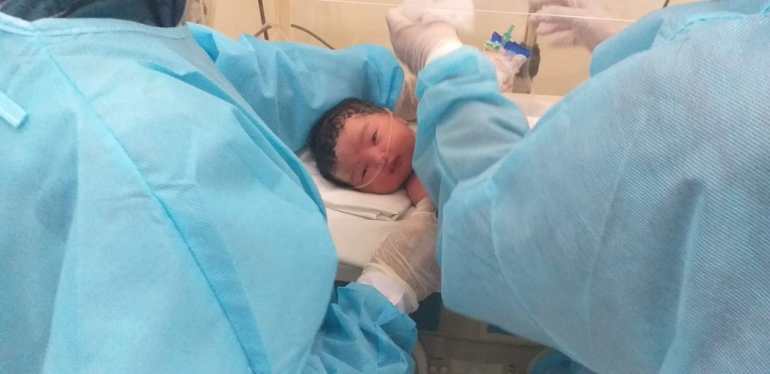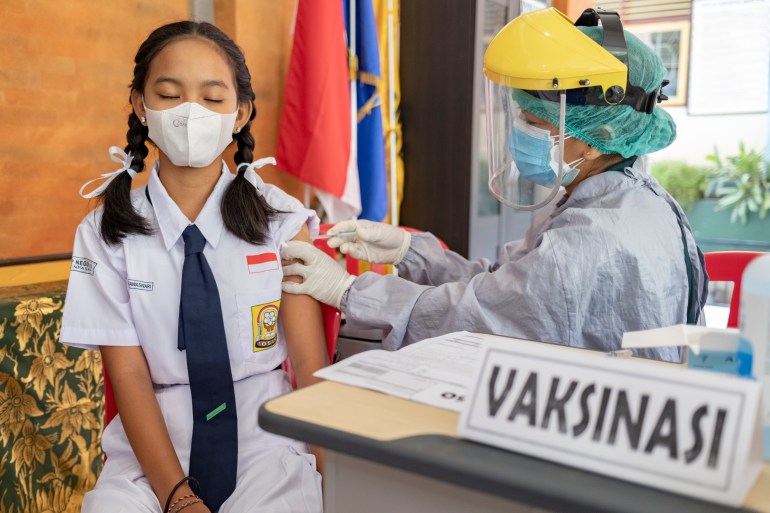
COVID sweeps Indonesia, fear of pregnant women and children | Coronavirus pandemic news
[ad_1]
Medan, Indonesia – When COVID-19 hit his family, Satria Krisnaditya Permana was busy preparing for the birth of his first child.
Satria and his 24-year-old wife Sari Azalea Yuliani were 37 weeks pregnant and expecting a baby girl. They tested positive for COVID-19 shortly after Sari’s father was diagnosed with the virus two weeks ago.
At first, everything seemed to be fine.
The couple often spent time with Sari’s father. They chose to isolate themselves at their home in Bekasi, a satellite city on the outskirts of Jakarta, where they had everything they needed.
But two days later, Sally started to have a high fever.
Satria said she “began to be confused” and the doctor told them that the baby was in pain. Sari was taken to Esnawan Antariksa Air Force Hospital in Jakarta.
“It’s definitely a mess,” Satria said. “There are people everywhere.”
Since the second wave of infections is believed to be due to the Eid al-Fitr holiday in May and the second wave of infections caused by the epidemic, hospitals across Indonesia have been on the brink of collapse in recent weeks, and the total number of cases in the country has surged to over 2 million. The arrival of the more aggressive Delta variant.
On Tuesday, more than 30,000 new cases were reported and more than 700 people died. The death toll in Indonesia now exceeds 60,000, and there is growing concern about the impact of this disease not only on pregnant women but also on babies and children.
When his wife got a room in the Air Force Hospital, Satria breathed a sigh of relief, but by June 30, her oxygen level had dropped to 85%, and the doctor decided that she needed an emergency C-section.
In order to protect her from COVID-19, Sari’s daughter was taken away as soon as she was born, and the young Kirana Azalea Permana was put in an incubator.
Satria is still in quarantine at home, so he cannot participate in childbirth. Two days later, just after Friday prayers, the devout Muslim received a call from the hospital.
“Keep on praying, your wife is in critical condition and needs a ventilator,” a nurse told him. A few hours later, Sari was declared dead and was hurriedly buried in the Rorotan COVID-19 Cemetery in Jakarta in accordance with the coronavirus protocol.
“My wife has never even seen her own children well,” Satria said. “She can’t breastfeed as she planned. It’s heartbreaking.”
But Satria didn’t even have time to grieve over Sari’s death.
The baby Kirana had complications at birth and needed to be admitted to the neonatal intensive care unit for further treatment. But all neonatal intensive care units in Jakarta and surrounding areas are full. Satria’s parents desperately tried hospitals in Jakarta and its surrounding cities, and finally found two hospitals that could receive Kirana, one in Bandung and the other in Cirebon.
On July 2, Kirana was taken by ambulance to Bandung, a hospital that is closer, but it still takes about two hours to travel.
Unfortunately, she passed away the next morning.
As baby Kirana tested negative for the coronavirus, her family was allowed to bury her in Bekasi near her home.
“We tried very hard to save my daughter, but maybe it was too late,” Satria said. “She persisted in this cruel world for three days. Now, the two of them are in heaven together.”
Many unknowns
According to data from the Indonesian Association of Obstetricians and Gynecologists (POGI), since the start of the pandemic, more than 500 pregnant women in Indonesia have tested positive for coronavirus and 4.5% of them require intensive care.
Approximately 3% of people die from this disease.
 The baby Kirana was born through an emergency caesarean section and did not test positive for the new coronavirus, but she died in the intensive care unit on July 3 [Courtesy of Satria Krisnaditya Permana ]
The baby Kirana was born through an emergency caesarean section and did not test positive for the new coronavirus, but she died in the intensive care unit on July 3 [Courtesy of Satria Krisnaditya Permana ]
Dr. Wahyudi Gani, a gynecologist and obstetrician at Stella Maris Hospital in Medan, North Sumatra, said that there are still many unknowns about how COVID-19 affects mothers and babies.
He told Al Jazeera: “Generally speaking, the coronavirus is not dangerous for pregnant women, but its short-term and long-term effects on the fetus are still unclear.”
Dr. Wahyudi said that POGI’s current recommendation is that the coronavirus vaccine is safe for women over 12 weeks of pregnancy, but the government has not yet approved mass vaccination for pregnant women.
Therefore, Sari was not vaccinated against COVID-19, nor did Rohmanita, 42 years old, died in Medan on June 27.
Rohmanita and her husband Ricky Hidayat have been trying to have a baby for five years. When she started to feel unwell, Rohmanita was pregnant with the couple’s first child for 38 weeks.
“She fell ill on June 24 and she tested positive for the coronavirus two days later. She died at sunset the next day,” Ricky told Al Jazeera.
“It’s so fast. We have been quarantining at home because she is pregnant. Her due date is still 10 days, so we don’t want to go to the hospital. I took care of her for four days before she died.”
 Ricky Hidayat watched the funeral of Romanita from the cliff above Simalingkar B Cemetery in Medan [Aisyah Llewellyn/AL Jazeera]
Ricky Hidayat watched the funeral of Romanita from the cliff above Simalingkar B Cemetery in Medan [Aisyah Llewellyn/AL Jazeera] According to the COVID-19 agreement, Rohmanita and her unborn child were buried while her husband watched from a distance [Aisyah Llewellyn/AL Jazeera]
According to the COVID-19 agreement, Rohmanita and her unborn child were buried while her husband watched from a distance [Aisyah Llewellyn/AL Jazeera]
Housewife Rohmanita was buried with her unborn child in a special COVID-19 cemetery in Medan, in compliance with the coronavirus protocol. Health regulations mean that Ricky cannot go to the cemetery. Instead, he watched the coffin descend into the ground from a cliff overlooking the cemetery.
According to the gravedigger Abdi, there are at least three other babies buried in the same cemetery, including one one day old, one one month old and one three month old.
“According to our records, since the start of the pandemic, 14 children in Medan have died of the coronavirus, between the ages of less than a month and 15 years old,” Inke Nadia, a pediatrician on the COVID-19 mission in North Sumatra Dr. D Lubis said Li told Al Jazeera.
“Some of them have no previous health conditions, and some have potential health problems. Children under one year of age are obviously at higher risk if they contract the virus.”
Higher risk
According to data from the Indonesian Academy of Pediatrics (IDAI), the rate of infection among Indonesian children is increasing faster than that of adults, which may be because more children have been tested in recent months.
IDAI also found that as of June 28, the number of positive COVID-19 cases among children aged 0-18 had risen to 12.6% (or every eighth of those infected), and the child mortality rate for children aged 1-18 was 0.6%. Dr. Cynthia Centauri, a pediatrician at the University Hospital of Indonesia (RSUI) in Depok, a suburb of Jakarta, told Al Jazeera that the rates for children aged 6 to 18 are 5% and 0.6%, respectively.
The number of COVID-19 cases among teenagers and children under the age of 18 continues to increase every week.
According to IDAI data, from June 28 to July 4, more than 11,000 children under the age of 18 tested positive for COVID-19, compared with more than 7,000 in the previous week.
 Many babies are buried in Simalingkar B Cemetery in Medan, including one 3 month old and one 6 month old [Aisyah Llewellyn/Al Jazeera]
Many babies are buried in Simalingkar B Cemetery in Medan, including one 3 month old and one 6 month old [Aisyah Llewellyn/Al Jazeera]
“In the RSUI itself, the total number of inpatients and outpatients has increased. In recent weeks, the number of outpatient pediatric patients in COVID-19 polyclinics has at least doubled, and we have seen patients with more severe symptoms than before,” said Dr. Cynthia.
She added that the symptoms of coronavirus in children appear to be different from those in adults.
She said that children infected with the coronavirus will not only have respiratory diseases such as cough, runny nose or shortness of breath, but also gastrointestinal diseases such as vomiting or diarrhea, or skin rashes on the body.
Of the more than 2.3 million cases reported in Indonesia, more than 200,000 cases involved children under the age of 18, and 30% of the cases involved babies born during the pandemic. To date, more than 600 children in Indonesia have died of COVID-19.
“We want to cry. Whose child is dying? Indonesia child. Our children and grandchildren, if not for our children and grandchildren, what do we live for?” IDAI head Dr. Aman Pulungan said on Monday.
At the end of June, IDAI issued a set of official recommendations on COVID-19 vaccines for children and adolescents, advising the government to speed up child vaccination programs.
At present, the Indonesian government has approved the vaccination of children and adolescents between the ages of 12 and 17, and the decision to provide COVID-19 vaccination for children between the ages of 3 and 11 is still awaiting the results of further clinical studies.
“The provision of COVID-19 vaccination for children should be welcome,” Dr. Cynthia said. “We hope not to hesitate anymore, especially if parents want to vaccinate their children. With this vaccine recommendation, we hope that the coverage of COVID-19 vaccination will continue to increase in order to reduce the infection rate of COVID-19 among children in the entire archipelago. Morbidity and mortality.”
 Indonesia has approved a vaccine for children 12 years of age or older.Due to the surge in cases, doctors urge parents to ensure that their children are vaccinated [File: Made Nagi/EPA]
Indonesia has approved a vaccine for children 12 years of age or older.Due to the surge in cases, doctors urge parents to ensure that their children are vaccinated [File: Made Nagi/EPA]
At the cemetery in Medan, Ricky told Al Jazeera that he also hopes that people will start to take the epidemic more seriously. “People say there is no coronavirus. But there is a coronavirus. I saw it with my own eyes,” he said.
In Bekasi, Satria agreed.
“I know very well that the government is not ready for the second wave of the epidemic,” he said. “I hope we can understand better. This is very real. Some people think this is a complete conspiracy, but I can tell you that COVID-19 has also taken away my love for life and my daughter.”
Satria, who makes a living selling computer parts, said it was his wife’s dream to open a small shop of his own one day.
“So, now, I want to chase that dream for her. I still talk to her and tell her that she will be my forever wife, and I will make her proud,” he said. “She perseveres as much as possible, and I know that she and my daughter are smiling at me in heaven now.”
“She would be such a good mother.”
[ad_2]
Source link



